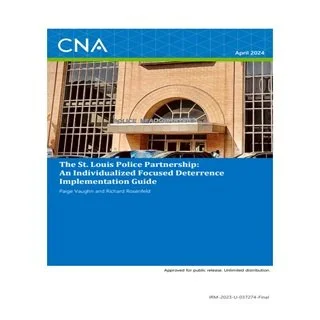By Paige Vaughn and Richard Rosenfeld
Focused deterrence is a particularly promising approach for significantly reducing gang, group, and individual criminal behavior. Typical focused deterrence approaches involve bringing together individuals at high risk for violence in face-to-face group interventions, usually called “offender notification meetings” or “call-ins.” In the St. Louis Police Partnership, individuals at high risk for violence were instead targeted using customized, individual in-person meetings with detectives and parole officers assigned to the program. This novel approach was found to be effective using a randomized controlled trial evaluation. This implementation guide summarizes the basic features of the St. Louis Police Partnership, discusses challenges and lessons learned, and details key steps that must be taken to implement similar programs effectively in other jurisdictions
Arlington, VA:CNA, 2024. 17p.





